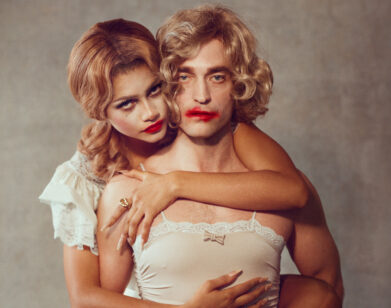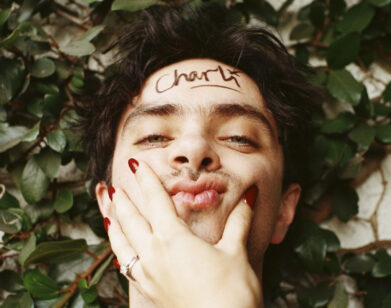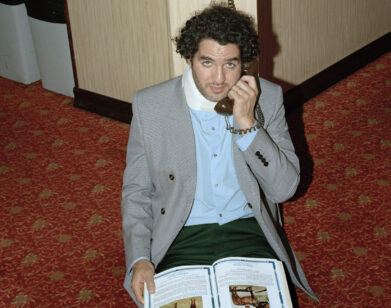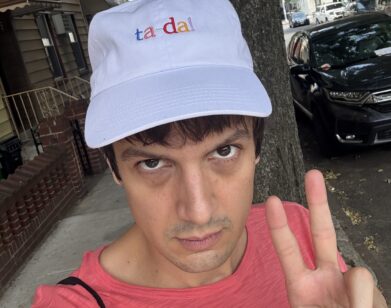With First Cow, Kelly Reichardt Gives Us Friendship, Clafouti, and Udders
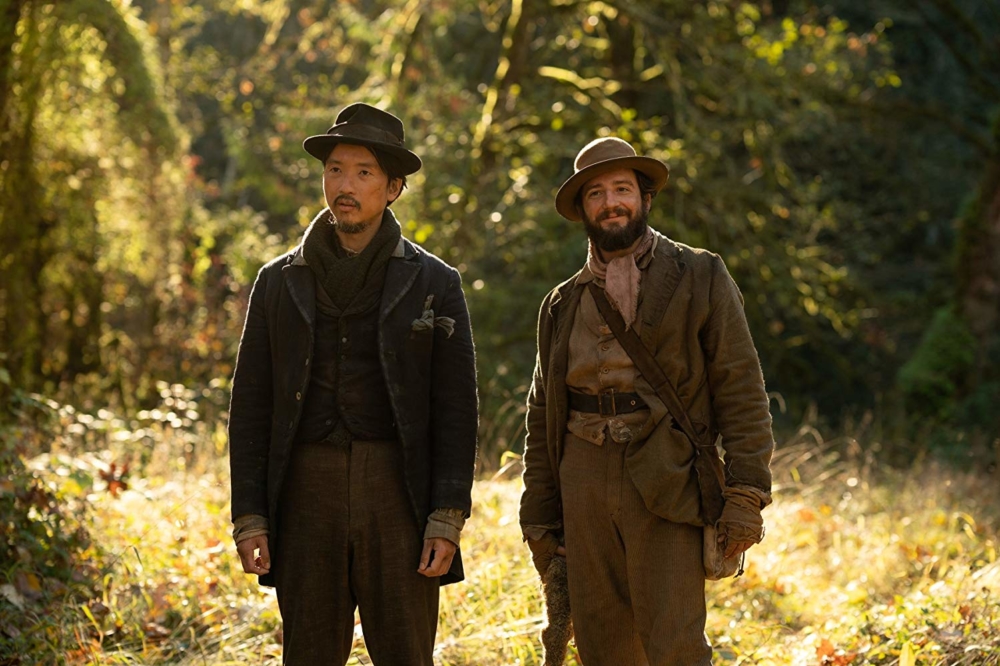
“First Cow,” courtesy A24.
Clarifying the setting of her newest feature film First Cow, the director Kelly Reichardt tells me that the story “settles down into the 1800s.” Those familiar with Reichardt’s work will appreciate this particular phrasing; the way she edits her own films creates a story into which the spectator can sink rather than being frogmarched through. Reichardt attributes her granular focus to the satisfaction she finds in “getting into the minutia of things,” from her short film Travis, about the invasion of Iraq, to her studies of necessary companionship like Wendy and Lucy and Certain Women—each keen enough to air out the politics of our everyday lives.
We spoke to Reichardt over the phone about First Cow, a sort of buddy comedy about two settlers, Cookie (John Magaro) and King-Lu (Orion Lee), navigating the early gatekeeping mechanisms of capitalism with enthusiasm that is both joyous and chilling. Because First Cow finally tells the first feature-length story she wanted to write with her frequent collaborator Jonathan Raymond, it allows us to see the kindling of Reichardt’s steadfast themes: necessary codependence and a devotion to process. Though here, there are more udders.
———
BESSIE RUBINSTEIN: A question that the film asks is about need: what people need, and what nourishes them. Money, a taste of home, and most of all, it seems, friendship. What do you need?
KELLY REICHARDT: All those things. You need your basics, like a roof over your head, warmth, food and yeah, you need friendship. I mean, I think the William Blake quote at the beginning of the film, which is how Jonathan Raymond started his novel—“The bird a nest, the spider a web, man friendship.”—I think that was kind of the guiding light for me, making this movie.
RUBINSTEIN: I read that The Half Life was the one that originally made you want to work with John. Is that right?
REICHARDT: Yeah, that’s right. It was his first novel. The first thing I read by him.
RUBINSTEIN: Were there particular production difficulties associated with this story? Why did you wait to adapt this book for the screen?
REICHARDT: Mostly I’ve been working just from novellas and short stories, like the Maile Meloy stories for Certain Women, or the stories I’ve gotten from John. Or we start with an idea and we make it a screenplay. It’s always been things that are smaller that I can extend, and get inside of them, and do. And this was a novel. It covers four decades, and they take a ship to China. And I work on really small budgets, so aside from the budgetary things, it was just this span, because I like getting into the minutia of things. I’m usually like, “Okay, two weeks, that’s how long we’ll be with these people.” And this was a lifetime. So it always seemed out of my grasp, but we’ve been mulling it over for so long, thinking of different ways at it. And then finally this idea of the cow came: this whole vehicle for how we could get some of the themes from the novel and the characters from the novel into a story. The answer was to swap out the heist that happens in the book. So then, we had our own little road to work on, and Jonathan was able to fuse together two lead characters that are in the novel into King-Lu. He’s kind of a makeup of two people. Also, the novel goes from 1980 back and forth to the 19th century. And so instead we had the prologue, and then just settled down into the 1800s.
RUBINSTEIN: I was wondering about the prologue, because I know that you’re hesitant for too many parallels to be drawn between now and then—for the film to be an explicit commentary. And I’d imagine that for a story about Westward expansion, there’d be a particular pressure to make something “urgent” and “provocative.” Was there any kind of pressure to portray a very opinionated origin story, something less restrained?
REICHARDT: The prologue is meant to make a link between then and the now, but I try to stay away from making complete parallel lines. I know that I feel the film is relevant to the politics of the day, but I just try to stay in the head of my own story when I’m working on it. And that opening shot with the barge is also introducing the Columbia river, which is where the whole story takes place. And which was a thoroughfare for trade for the Chinook. It’s where the cow comes down and King-Lu takes his canoe ride, so this shot was really to introduce you—here’s this place off the Columbia river, where the fort would have been for trading.
RUBINSTEIN: Yes, and where they both end up. When I was watching King-Lu and Cookie’s friendship evolve, and King Lu’s optimistic, entrepreneurial spirit, I couldn’t help but think of the eventual treatment of Chinese-Americans participating in capitalism a few decades down the road.
REICHARDT: You could reach out in so many directions with this film. It’s helpful, knowing that you have one little story and you’re keeping to your story, of these two guys and their situation. And that you’re with them for this set amount of time. Everything is so close to the ground. We start with Alia (Shawkat) digging and the dog digging, and then Cookie, foraging. And I feel like that says, “Alright, here’s an earthbound movie that’s dealing with these sort of low to the ground things.” Had I started with a drone shot, then you would’ve known that I was making the big statement. It was so important just to learn about the Chinook and the language, and how they park their canoes and how the beaver brought trade. There was so much to learn.
I didn’t think about internment camps and all that, but I did think about, in casting, what an uphill battle Asian actors have. I mean, my god, talk about type-casting. It is really dismal, the amount of talented people in not-great roles. It must be such a frustrating thing. I like that you can see the seeds of capitalism and the natural world in the film. And ask this question of, can those two things coexist?
RUBINSTEIN: One of the real pleasures of the movie was the appreciation of small morsels of food. For some reason I was fixating on that, because I just wolf down a bag of chips. I think most of us do, so it was nice to focus on the process of a single biscuit, for example—to see single dollops of dough dropping into oil and spreading out.
REICHARDT: It’s funny, because King-Lu and Cookie, there’s a point when the lines of people are coming from outside the fort to taste their biscuits, and you’re just like, “Oh, they’re the artisan guys, the bearded guys in Portland making their coffee shop.”
RUBINSTEIN: White guys with dreads.
REICHARDT: Yeah, exactly. The great thing about doing period pieces is being able to work at that pace. Your time worked differently then. So it’s completely legitimate to be just spending time in a scene, and showing the process of how something gets made, like with the clafoutis. First you go out, you get the berries, you get the milk, you come back, you build the fire. You do these things that make for an intimacy that happens between the characters; they can grow to know each other without having to resort to words. Their friendship has nothing to do with anything that’s coming out of either of their mouths. It’s just totally not in the dialogue with them. We actually get to see them starting to spend time with each other and to cook and to sew, and to be in the fire light together.
RUBINSTEIN: It reminded me of animals getting used to each other. Checking each other out, and then habituating, growing more comfortable. And of course, you like to work with animals—Wendy and Lucy was the first film of yours I saw, in which Lucy, a dog, is one of only two crucial characters. Evie the Cow is also that crux. I was curious about the casting process for Evie. Did you have cow auditions?
REICHARDT: It was head shots of cows, and body shots, and then narrowing down the type of cow. We chose the Jersey cow because of its size. I wanted Evie to be someone that you can be friends with, and wasn’t intimidating. And Jersey cows have those huge, soft eyes. They would have been around on the East Coast, too, so it made some sense. So we went out and looked for Jersey cows, and then more head shots came in, and more body shots. And then I saw Evie, and then I got videos of Evie. She was easy to settle on, because she was so beautiful. Just like casting people—you find the prettiest actress and you go, “Okay, perfect. She has the right body type.” I didn’t want Evie to be too big. [Laughs] Then they started training Evie so that she would be comfortable. The main thing was that she’d be comfortable on the ferry, because cows can’t swim, and we didn’t want anything to go wrong.
I have to say, when you’re dealing with actual casting of people in the folder, and it’s the end of the day, you’re like, ah, let me look at the cows. It feels so nice. Cow casting.
RUBINSTEIN: Have you met her baby?
REICHARDT: Only in pictures. Cookie.

